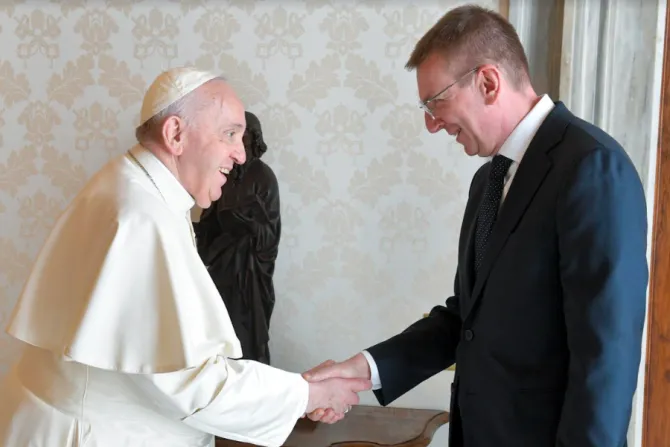Pope Francis meets Latvian foreign minister Edgars Rinkēvičs at the Vatican, March 14, 2022. | Vatican Media.
Latvia’s Foreign Minister Edgars Rinkēvičs believes that as war rages in Europe, the Church has a fundamental task: “to keep the moral compass not to let the world lose humanity.”
Rinkēvičs, who has led Latvia’s foreign ministry since 2011, was speaking during a two-day visit to the Vatican. He met with Pope Francis on March 14 and the Vatican “foreign minister” Archbishop Paul Gallagher a day later.
His meeting with Pope Francis was notable because the pope usually only receives heads of state and prime ministers, along with ambassadors (when they present their letters of credence.) Holy See protocol does allow for the possibility of a papal audience for foreign ministers, but this is very rare and only for special occasions.
Latvia, however, had a special occasion: the centenary of the Baltic country’s concordat with the Holy See, which was signed on May 30, 1922. The Holy See was also one of the first countries to recognize the newly established Latvian state in 1918.
Diplomatic ties were interrupted in 1940 after the Soviet invasion of Latvia, but restored in 1991. The Holy See, however, always considered the break in diplomatic relations temporary as it did not recognize the Soviet occupation.
Latvia, a country of 1.9 million people, borders Russia, Belarus, Lithuania, and Estonia. It has received more than 4,000 refugees since Russia’s full-scale invasion of Ukraine on Feb. 24.
Rinkēvičs told CNA that his Vatican visit had been “planned for some time” before the war broke out.
“I know that a foreign minister’s audience with the pope is not usual, but we are not living in usual times,” he commented.
“We had a discussion with the Holy Father about the humanitarian disaster. As a result, Latvia is receiving refugees from Ukraine, though not as many as the countries bordering Ukraine.”
He said that his talks with Archbishop Gallagher focused on “cooperation in the international organisation, and of course the current security situation in Europe.”
Rinkēvičs, who was born in 1973 and grew up in the Soviet era, agreed that what is happening in Ukraine has had an “emotional impact.”
“After what happened in 2014, with the Russian occupation and the annexation of Crimea, and then the Russian invasion of Ukraine last Feb. 24, the Central European nations started asking themselves if this was a sort of repetition of history,” he said.
But he added that “from the rational point of view, there are huge differences with what happened 80 years ago.”
“We are now members of NATO and, although we are a small country and not very rich, we are also trying to find a way to support Ukraine,” he said. “Even some Russians now understand that if we do not stop Russia in Ukraine, the problem is going to become tragic.”
Rinkēvičs expressed great appreciation for Pope Francis’ statements on the war. He stressed that “the Holy See could be an excellent mediator if Russia and Ukraine agree.” But he cautioned that “Russian leaders still think they can achieve the goals they set with force.” So Russia, in his view, may not “seek a diplomatic solution.”
The decision over whether the Vatican would act as a mediator “rests first of all with Russia,” he said.
“There will be a time to stop the war and to find a good way out of it, and maybe the Holy See at that point will be a good mediator.”
Source: CNA

